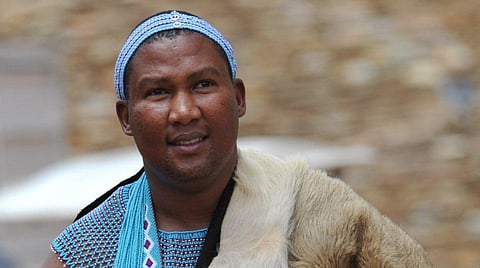Kenneth Mokgatlhe: Mandla Mandela’s selective activism
Key topics:
Mandla Mandela criticised for ignoring crises in South Africa’s Eastern Cape
Critics say his anti-Israel activism serves personal political relevance
Mandela's cousins visited Israel, showing more open, evolving perspectives
Sign up for your early morning brew of the BizNews Insider to keep you up to speed with the content that matters. The newsletter will land in your inbox at 5:30am weekdays. Register here.
Support South Africa’s bastion of independent journalism, offering balanced insights on investments, business, and the political economy, by joining BizNews Premium. Register here.
If you prefer WhatsApp for updates, sign up to the BizNews channel here.
By Kenneth Mokgatlhe*
While it could be seen by others as a positive move to pursue anti-Israel campaigns by Nelson Mandela’s grandson, Mandla Mandela, it is worth noting that he leaves a cascade of problems in South Africa Africa which his party, the ANC, has caused and fails to address. It is his party, which he represented as its member of parliament for many years, that has crippled the government at every level. It seems Mandela is deficient in either compassion or basic common sense in his approach.
His cousins, who are Nelson Mandela's granddaughters, Zaziwe Manaway and Zamaswazi Mandela, recently embarked on a life-changing journey to Israel and Gaza to witness the conflict for themselves rather than relying on biased media reporting, which further complicates this complex conflict which have lasted for several decades. Their encounters changed their views about both Gaza and Israel. Unlike Mandla Mandela, their cousin, their views are not fixed.
Mandla Mandela has identified the Israel-Palestine impasse as a political capital to remain relevant in the international discourse. During his time as a traditional leader and politician, he was in his duty as the Member of Parliament (MP) to hold those who continued to steal public funds accountable. The public infrastructure collapsed in his home province of the Eastern Cape, but he did not make a noise.
Each year, the Eastern Cape records the highest number of deaths of children from diarrhea and malnutrition, but Mandela and his fellow leaders from the ANC have not condemned these unnecessary deaths, which could be blamed on ineptitude, corruption, and mismanagement. In 2008 alone, 80 children in the Ukhahlamba District Municipality died as a result of diarrhea from unpurified water. As usual, Mandela did not utter a single word then because the lives of the people of the Eastern Cape did not matter. Or was it because such challenges do not draw media attention, less political and financial interest than the Israel-Palestine conflict?
This year, 2025, the first 6 months have seen some 70 children dying from malnutrition, which should be blamed on the corrupt leadership of the ANC, which continues to collapse the government in that poor province. There is a greater possibility that the number of fatalities could be higher than recorded from the public facilities. In 2024, last year, the number of children who died from malnutrition in the Eastern Cape was reported to have been 107.
It does not augur well that we have someone in the person of Mandla Mandela who becomes an activist when it is convenient for him but ignores other, more serious and urgent situations taking place in his backyard. It is said that “charity begins at home”; this means that one should prioritise their own place before they can interfere in foreign places.
The situation is not only dire in the Eastern Cape. There are parallel investigations into the criminal justice system by the Madlanga Commission appointed by the head of cabinet, President Cyril Ramaphosa, as well as the parliamentary Ad-Hoc Committee doing the same thing. This shows that the country’s intelligence is on its knees and has failed to perform its constitutional duties.
Mandla Mandela is aware that in 2024 alone, South Africa recorded 26,232 murders number surpassing those coming out of war zones. He could as well start his advocacy and activism here at home to stop unnecessary killings by using his influence within his party and his kingdom. South Africa has more problems where Mandela can play a very effective role and help to transform the lives of the many, rather than grandstanding without any tangible results.
*Mokgatlhe is a fellow at the Middle East Africa Research Institute (MEARI)

